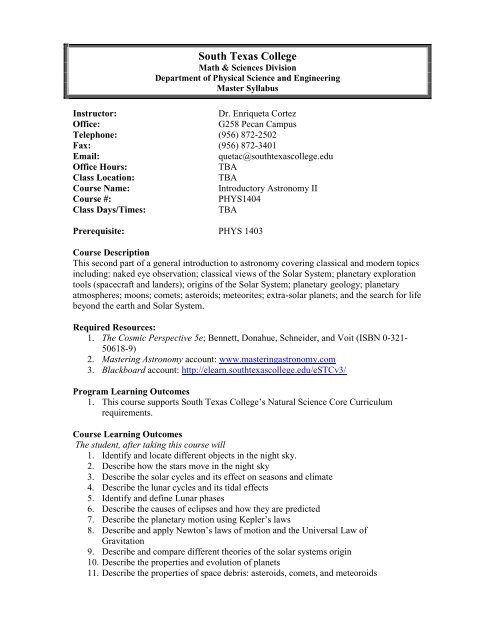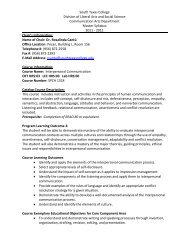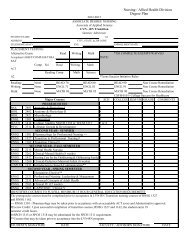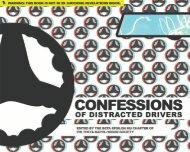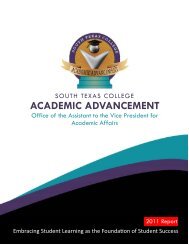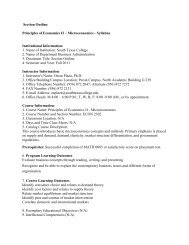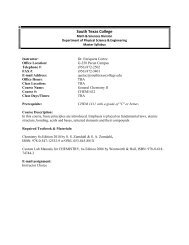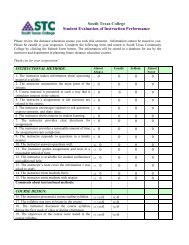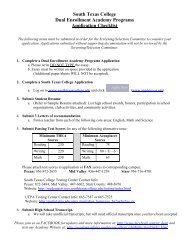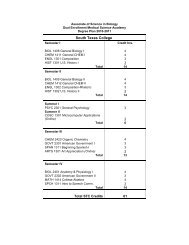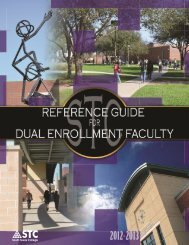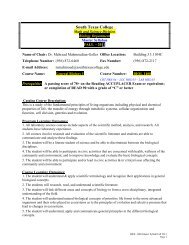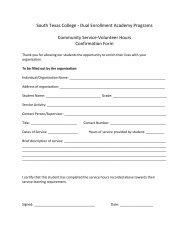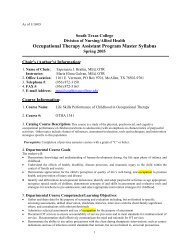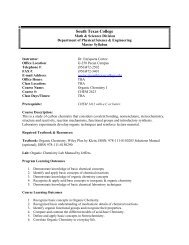PHYS 1404 Introductory Astronomy II - South Texas College
PHYS 1404 Introductory Astronomy II - South Texas College
PHYS 1404 Introductory Astronomy II - South Texas College
You also want an ePaper? Increase the reach of your titles
YUMPU automatically turns print PDFs into web optimized ePapers that Google loves.
<strong>South</strong> <strong>Texas</strong> <strong>College</strong><br />
Math & Sciences Division<br />
Department of Physical Science and Engineering<br />
Master Syllabus<br />
Instructor:<br />
Dr. Enriqueta Cortez<br />
Office:<br />
G258 Pecan Campus<br />
Telephone: (956) 872-2502<br />
Fax: (956) 872-3401<br />
Email:<br />
quetac@southtexascollege.edu<br />
Office Hours:<br />
TBA<br />
Class Location:<br />
TBA<br />
Course Name:<br />
<strong>Introductory</strong> <strong>Astronomy</strong> <strong>II</strong><br />
Course #:<br />
<strong>PHYS</strong><strong>1404</strong><br />
Class Days/Times:<br />
TBA<br />
Prerequisite: <strong>PHYS</strong> 1403<br />
Course Description<br />
This second part of a general introduction to astronomy covering classical and modern topics<br />
including: naked eye observation; classical views of the Solar System; planetary exploration<br />
tools (spacecraft and landers); origins of the Solar System; planetary geology; planetary<br />
atmospheres; moons; comets; asteroids; meteorites; extra-solar planets; and the search for life<br />
beyond the earth and Solar System.<br />
Required Resources:<br />
1. The Cosmic Perspective 5e; Bennett, Donahue, Schneider, and Voit (ISBN 0-321-<br />
50618-9)<br />
2. Mastering <strong>Astronomy</strong> account: www.masteringastronomy.com<br />
3. Blackboard account: http://elearn.southtexascollege.edu/eSTCv3/<br />
Program Learning Outcomes<br />
1. This course supports <strong>South</strong> <strong>Texas</strong> <strong>College</strong>’s Natural Science Core Curriculum<br />
requirements.<br />
Course Learning Outcomes<br />
The student, after taking this course will<br />
1. Identify and locate different objects in the night sky.<br />
2. Describe how the stars move in the night sky<br />
3. Describe the solar cycles and its effect on seasons and climate<br />
4. Describe the lunar cycles and its tidal effects<br />
5. Identify and define Lunar phases<br />
6. Describe the causes of eclipses and how they are predicted<br />
7. Describe the planetary motion using Kepler’s laws<br />
8. Describe and apply Newton’s laws of motion and the Universal Law of<br />
Gravitation<br />
9. Describe and compare different theories of the solar systems origin<br />
10. Describe the properties and evolution of planets<br />
11. Describe the properties of space debris: asteroids, comets, and meteoroids
Core Curriculum Exemplary Educational Objectives<br />
1. To understand and apply method and appropriate technology to the study of natural<br />
sciences.<br />
2. To recognize scientific and quantitative methods and the differences between these<br />
approaches and other methods of inquiry and to communicate findings, analyses, anf<br />
interpretation both orally and in writing.<br />
3. To identify and recognize the differences among competing scientific theories.<br />
4. To demonstrate knowledge of the major issues and problems facing modern science,<br />
including issues that touch upon ethics, values, and public policies.<br />
5. To demonstrate knowledge of the interdependence of science and technology and<br />
their influence on, and contribution to, modern culture.<br />
Intellectual Competencies<br />
1. Students will read, analyze and interpret textbook, handouts, astronomy experiment<br />
manuals, and/or visual aids used during the semester.<br />
2. Students will develop, organize, draft, revise, and write reports for experiments<br />
conducted during the semester and/or research topic related to astronomy.<br />
3. Students will use computer-based technology in solving problems, conducting<br />
computer based astronomy labs and will use internet to access websites that will<br />
assist in their study of astronomy.<br />
4. Students will demonstrate effective oral communication techniques using clear<br />
concise and informative language when speaking.<br />
5. Students will analyze and interpret various forms of spoken communication like<br />
lecture by the instructor, discussion with the lab partners, or audio video<br />
demonstrations during the lectures.<br />
6. Students will demonstrate problem-solving skills in a logical step-by-step process<br />
when doing astronomy labs. They will apply methods of qualitative and quantitative<br />
analysis during their understanding and following the lab procedures.<br />
Departmental Course Perspective<br />
1. Students will recognize the importance of maintaining health and wellness by<br />
following the safety procedures, maintaining cleanliness, and avoiding contact with<br />
materials hazardous for health, while doing the astronomy labs<br />
2. Students will develop a capacity to use knowledge of how technology and science<br />
affect their lives by utilizing everyday practical examples and applications of<br />
astronomy and by performing astronomy experiments.<br />
3. Students will develop personal values for ethical behavior by understanding the<br />
rules and regulations in relation to safety, cited works, and disposal of waste<br />
materials after performing astronomy labs.<br />
4. Students will use logical reasoning in problem solving by identifying and analyzing<br />
astronomy word problems and selecting a logical solution<br />
5. Students will integrate knowledge and understand the interrelationships of<br />
scholarly disciplines by using technical writing, applying the rules of mathematics,<br />
tracing the history of philosophy describing different aspects of sciences, and finding<br />
astronomy’ applications in biology and technology while studying astronomy.
Instructor Outcomes<br />
Department Course Grading Criteria<br />
Lecture: 75%<br />
Instructor Choice<br />
Lab: 25%<br />
Instructor Choice<br />
Grading Time Line:<br />
Instructor Choice<br />
Class Policies:<br />
Instructor Choice<br />
Lab Policies:<br />
Instructor Choice<br />
Attendance Policies:<br />
Instructor Choice<br />
Resources:<br />
Student study guide accompany textbook, library, multimedia, Internet, and Biology<br />
Computer Lab.
<strong>Introductory</strong> <strong>Astronomy</strong> <strong>II</strong><br />
Course Calendar<br />
WEEK CHAPTER(S) LAB<br />
Week 1<br />
Ch. 1: Our Place in the Universe; Dimensions of the universe<br />
Course Introduction<br />
Week 2<br />
Ch. 2: Discovering the Universe for Reason for Seasons, Rotating Sky<br />
Yourself<br />
Week 3 Ch. 2: Lunar Phases and Eclipses Earth-Sun- Moon dynamics<br />
Week 4 Review of Ch. 1 and Ch. 2 Exam 1<br />
Week 5 Ch. 3: The Science of <strong>Astronomy</strong> : The Nature of Science<br />
Ancient roots<br />
Week 6 Ch. 4 Making Sense of the Universe Motion – Energy - Gravity<br />
Week 7<br />
Ch. 4: Kepler’s Laws; Planetary<br />
Motions<br />
Newton’s Version of Kepler’s Laws<br />
Week 8 Review of Ch. 3 and Ch. 4 Exam 2<br />
Week 9 Ch. 7: Our Planetary System -<br />
Spacecraft Explorations<br />
Week 10<br />
Ch. 8: Formation of the Solar System<br />
- Origins - Age<br />
Week 11 Review of Ch. 7 and Ch 8 Exam 3<br />
Patterns in the Solar System<br />
Formation of the Planets<br />
Week 12<br />
Ch. 11: Jovian Planet System – Ring Satellites of Ice and Rock<br />
Planets<br />
Week 13 Ch. 12: Remnants of Rock and Ice – The Kuiper Belt Exam 4<br />
Pluto, Asteroids, Comets<br />
Week 14<br />
Ch. 9: Planetary Geology-Earth and Moon, Mercury , Mars and Venus<br />
the Other Terrestrial Planets<br />
Week 15<br />
Ch.10: Planetary Atmospheres-Earth<br />
and Other Terrestrial Worlds ; Earth’s<br />
Earth’s Climate History<br />
Exam 5<br />
Unique Atmosphere<br />
Week 16 Final Exam Week Student Presentations
FOUNDATION SKILLS<br />
1. Basic Skills: Reading, writing, mathematics, arithmetic, speaking and listening<br />
Students are required to read the text. Students will write notes during the lecture, lab,<br />
problems solving sessions, and review sessions and they must know how to spell. The<br />
students read the tests and the answers are in written form. They have to read the lab<br />
manuals for theoretical background, instructions, and procedures of the experiment and<br />
they have to write the lab reports.<br />
The students need arithmetic, algebra, trigonometry and analyzing skills to completely<br />
understand the principles and in the problem solving sessions. The student will ask and<br />
answer questions during the lecture, lab, and review sessions. They have to listen to the<br />
lecture and instructions for lab sessions. The oral communication includes presentation of<br />
material and group discussions during lab, lecture, problem solving, and review sessions.<br />
2. Thinking Skills: Learning and reasoning<br />
Problem solving is an essential component of understanding the principles of physical<br />
science and its application to everyday life. Student will be solving every day examples<br />
using math and analyzing skills. Visualizing the problem, and using reasoning to solve<br />
the problem solving. Thinking skill is an essential component of understanding and<br />
solving the problems.<br />
3. Technology: Computers and scientific apparatus<br />
Students will use word processing and a variety of software including tutorial, which<br />
accompany the text. Students have access to the Internet. Students will utilize scientific<br />
tools, which are required to perform the laboratory<br />
activities.<br />
4. Personal Qualities: Responsibility, self-esteem, sociability, self-management, integrity<br />
and honesty<br />
The students will be doing labs in groups. Team spirit, responsibility, sociability,<br />
community skills, self management and cooperation with other group members will be<br />
needed to perform the tasks completely.<br />
Developmental Studies Policy Statement:<br />
The <strong>College</strong>’s Developmental Education Plan requires students who have not met the<br />
college-level placement standard on an approved assessment instrument in reading,<br />
writing, and/or mathematics to enroll in Developmental Studies courses including<br />
<strong>College</strong> Success. Failure to attend these required classes may result in the student's<br />
withdrawal from ALL college courses.<br />
Statement of Equal Opportunity: No person shall be excluded from participation in,<br />
denied the benefits of, or be subject to discrimination under any program or activity<br />
sponsored or conducted by <strong>South</strong> <strong>Texas</strong> <strong>College</strong> on the basis of race, color, national<br />
origin, religion, sex, age, veteran status or disability.
Alternative Format Statement: This document is available in an alternative format<br />
upon request by calling ( 956 ) 872-8355.<br />
ADA Statement: Individuals with disabilities requiring assistance or access to receive<br />
services should contact Disability Support Services at ( 956 ) 872-2173.


